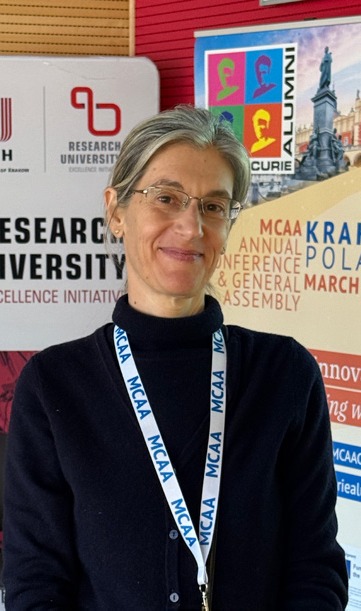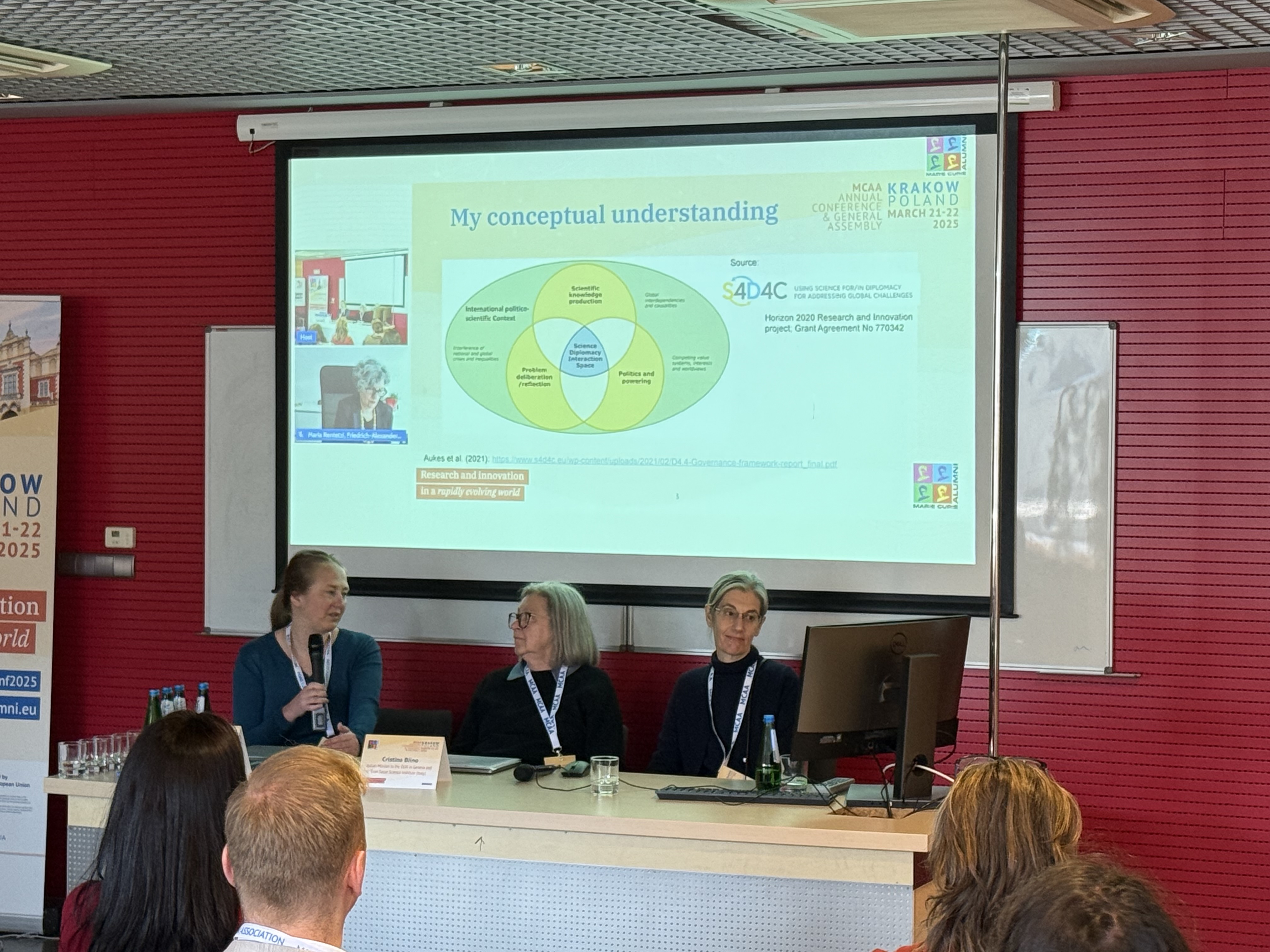MCAA Annual Conference 2025 - Empowering Women in Science Diplomacy
Newsletter
At the MCAA Annual Conference 2025, experts discussed the importance of gender equity in driving global innovation in a parallel session about empowering women in science diplomacy. The session addressed challenges such as the persistence of unconscious biases and the role of initiatives like CERN, offering strategies for fostering inclusivity, integrity, and ethical governance in global scientific collaboration.
Introduction
At the MCAA Annual Conference, the parallel session Empowering Women in Science Diplomacy for Global Innovation led by The0odota Lagouri, Researcher at CERN and Yale University, and Chair of the MCAA Policy Working Group, explored the critical intersection of science, diplomacy, and gender equity. Featuring distinguished speakers Elke Dall (Centre for Social Innovation), Maria Rentetzi (FAU Erlangen-Nürnberg), and Cristina Biino (Scientific Attaché, Italian Embassy in Geneva and Researcher at CERN), the session highlighted the evolving landscape of science diplomacy and underscored the need to elevate women’s voices in this historically male-dominated field.
Elke Dall, an expert in science diplomacy frameworks, has been involved in initiatives like Horizon 2020’s S4D4C project, which aimed at strengthening science diplomacy in Europe. Maria Rentetzi, a scholar in gender and nuclear diplomacy, discussed how historical biases continue to shape diplomatic institutions. Cristina Biino, a CERN physicist and Italy’s scientific attaché in Geneva, shared her insights from CERN and other international organisations, shedding light on international scientific diplomacy.

Theodota Lagouri
The session examined not only the challenges women face but also practical solutions for creating more inclusive, ethical, and effective global research collaborations.

Panel at the MCAA Conference Parallel Session ‘Empowering Women in Science and Diplomacy for Global Innovation’, held on March 21, 2025. On the podium (left to right): Elke Dall (ZSI), Cristina Biino (Scientific attaché), Theodota Lagouri (MCAA) and Maria Rentetzi (FAU) on screen, joined virtually.
Science Diplomacy: A Bridge Between Science, Policy, and Society
Science diplomacy is key to addressing global challenges like climate change and emerging technologies. It involves the intersection of scientific expertise, policy-making, and institutional frameworks. Achieving gender balance in this field remains a challenge.
The session also highlighted a report recommending A European Framework for Science Diplomacy, where scientific competition and collaboration coexist. In the Western Balkans, for example, women are stepping into leadership roles despite limited resources and political challenges. Tracking women’s contributions and ensuring equitable representation remains an ongoing effort. The session reinforced the need to continue working toward gender balance in science diplomacy.
Historical Barriers: Women’s Role in Nuclear Diplomacy
Historical biases have had a profound impact on women’s participation in science diplomacy, particularly in nuclear diplomacy. The IAEA, the International Atomic Energy Agency, initially male-dominated, still faces gender disparities in nuclear policy-making and diplomatic negotiations. Addressing these systemic barriers requires more than increasing the number of women in the field; structural changes are needed. This includes funding, mentorship programmes, and policy frameworks ensuring women's access to leadership positions in science diplomacy.
International Collaborations: CERN and SESAME as Models for Science Diplomacy
International collaborations like CERN (Conseil Européen pour la Recherche Nucléaire), the European Council for Nuclear Research and SESAME, the Synchrotron-Light for Experimental Science and Applications in the Middle East, serve as examples of how science diplomacy can bridge geopolitical divides. CERN, established to foster post- war European collaboration, now serves as a hub for global scientific exchange. Initiatives like OQI, the Open Quantum Institute within CERN, demonstrate how open science facilitates equitable access to transformative technologies like quantum computing.
SESAME brings together countries with historically strained relations, such as Israel, Jordan, Egypt, and Palestine and highlights how scientific collaboration can serve as a platform for peace-building and trust- building. Also, GESDA, the Geneva Science and Diplomacy Anticipator, plays a crucial role in anticipating scientific challenges and their diplomatic implications, particularly in emerging fields like artificial intelligence and biotechnology.
In these collaborations, the inclusion of women is essential to ensure diverse perspectives in shaping the future of global science diplomacy.
Breaking Barriers: Strategies for Inclusion and Leadership
The panel discussion highlighted practical strategies for increasing women’s representation in science diplomacy:
- • Data-Driven Policies: Collecting gender- disaggregated data to identify gaps and track progress.
- • Mentorship & Leadership Training: Creating mentorship programmes for early-career women in science diplomacy and pathways to leadership.
- • Institutional Support: Establishing funding mechanisms and policy frameworks that prioritise gender equity.
- • Interdisciplinary Education: Encouraging universities to integrate science diplomacy into STEM and social sciences curricula to equip future leaders with the necessary skills.
Achieving gender balance in science diplomacy is not only about fairness but also about creating more effective, inclusive, and ethical global research collaborations.
Towards a More Inclusive Future
The session concluded with a call to action. While progress has been made, sustained efforts are needed to dismantle systemic barriers and ensure that women play a central role in science diplomacy. Gender- sensitive policies, mentorship networks, and international cooperation are crucial for building a more inclusive and ethically robust scientific landscape.
Science diplomacy is a powerful tool for addressing global challenges, but its full potential can only be realised when women are actively involved in shaping its future. Moving forward, fostering equity, integrity, and ethical governance in science diplomacy is vital to ensuring that innovation serves all of humanity.
For updates and further discussions, join the MCAA Policy Working Group and email policy@mariecuriealumni.eu.
Theodota Lagouri
Orcid
X
LinkedIn
MCAA Policy Working Group Chair
Yale University & CERN
theodota.lagouri@cern.ch